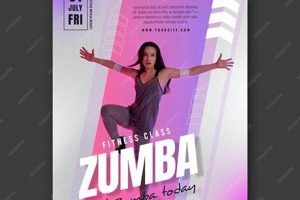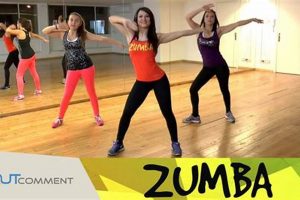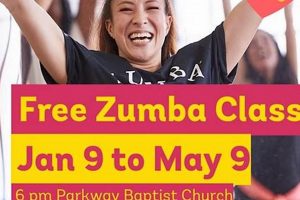Opportunities to participate in no-cost Zumba fitness sessions can be found within the Chicago metropolitan area. These sessions offer an accessible entry point to the popular dance fitness program for individuals with varying income levels. For example, community centers or park districts may periodically host complimentary classes as part of their outreach initiatives.
Participation in accessible dance fitness programs provides several benefits, encompassing physical, mental, and social well-being. Regular engagement can contribute to improved cardiovascular health, increased muscle tone, and enhanced coordination. The group dynamic fosters a sense of community and provides opportunities for social interaction, which can combat feelings of isolation. Historically, free fitness offerings have been utilized as a public health strategy to encourage physical activity and prevent chronic diseases.
The subsequent sections will detail resources for locating such opportunities, highlight specific locations that have previously offered these sessions, and explore alternative low-cost fitness options in the Chicago area. The goal is to provide a comprehensive overview for individuals seeking to engage in dance fitness without financial barriers.
Tips for Locating Accessible Dance Fitness Sessions in Chicago
Maximizing opportunities to participate in cost-free Zumba fitness sessions requires a proactive and informed approach. The following guidelines aim to assist individuals in discovering and accessing these valuable resources.
Tip 1: Utilize Community Resources. Local community centers, park districts, and public libraries often sponsor free fitness classes. Consult their websites or contact them directly for schedules and program offerings. Many offer these classes on a seasonal basis or as part of a specific community initiative.
Tip 2: Explore Online Platforms. Websites dedicated to community events or fitness listings may advertise free Zumba classes. Search using relevant keywords, focusing on Chicago-specific platforms or regional event calendars. Many organizations also list classes on their social media pages.
Tip 3: Connect with Local Fitness Studios. Some fitness studios may offer introductory classes or promotional events that include complimentary Zumba sessions. Check their websites or inquire about introductory offers. Sometimes studios will also partner with community organizations to offer free classes in public spaces.
Tip 4: Leverage Social Media Groups. Join local fitness-related social media groups to stay informed about free events and class offerings. Members often share information about complimentary classes and workshops. Actively participate and engage with the group to foster a network of information sharing.
Tip 5: Monitor City Government Announcements. The City of Chicago and its various departments occasionally sponsor free fitness programs in public parks or community spaces. Stay updated on city announcements and press releases for information on these initiatives. These programs are often temporary and offered seasonally.
Tip 6: Check with Local Churches and Religious Organizations. Many churches and religious organizations offer free community programs, which may include fitness classes like Zumba. Consult their websites or bulletins for class schedules and availability. These classes often have a strong community focus.
By employing these strategies, individuals can significantly increase their chances of discovering and participating in accessible dance fitness opportunities within the Chicago area, promoting health and well-being without incurring financial costs.
The next section will explore alternative low-cost options for those seeking to supplement these complimentary sessions or explore a wider variety of fitness activities.
1. Community Center Schedules
Community center schedules serve as a primary resource for individuals seeking no-cost Zumba fitness opportunities within Chicago. These schedules often outline a variety of programs offered to the public, including exercise classes, workshops, and recreational activities, some of which may be provided without charge.
- Schedule Accessibility and Transparency
The availability of community center schedules, whether online or in printed form, is crucial for accessibility. These schedules provide a transparent overview of class offerings, allowing potential participants to plan their attendance. For example, the Garfield Park Fieldhouse may publish a quarterly schedule listing free Zumba classes alongside other recreational programs. Without accessible schedules, individuals may be unaware of available opportunities.
- Class Frequency and Duration
The frequency and duration of Zumba classes listed in community center schedules directly impact accessibility. A schedule that includes multiple classes per week provides greater flexibility for individuals with varying schedules. A class advertised as “Zumba: 60 minutes, Mondays and Wednesdays” indicates the commitment required and the opportunity for regular participation. Schedules lacking specific details diminish the value of the offering.
- Instructor Qualifications and Class Descriptions
Community center schedules should ideally include information about instructor qualifications and brief class descriptions. This information allows participants to assess the suitability of the class for their fitness level and experience. A schedule indicating “Zumba – Certified Instructor, all levels welcome” provides reassurance and encourages participation. Lack of such details may deter potential attendees concerned about safety or suitability.
- Registration Procedures and Capacity Limits
A community center schedule must clearly delineate registration procedures, if required, and specify capacity limits for classes. This ensures a fair and orderly process for participation. A schedule stating “Pre-registration required, limited to 25 participants” informs potential attendees of the necessary steps and potential constraints. Omission of these details can lead to confusion and overcrowding, hindering the accessibility of the class.
In summary, community center schedules are pivotal in facilitating access to cost-free Zumba opportunities. The clarity, accessibility, and comprehensiveness of these schedules directly influence an individual’s ability to discover and participate in these fitness programs. The presence of these free offerings promotes community well-being by providing avenues for physical activity and social engagement regardless of financial constraints. The availability of consistent and dependable schedules is paramount in this regard.
2. Park District Offerings
Park district offerings serve as a primary conduit for the provision of complimentary Zumba fitness sessions in Chicago. The city’s park districts, funded by public resources, often incorporate fitness programs into their community outreach initiatives. This direct funding mechanism allows them to offer classes, including Zumba, without requiring participant fees. The availability of these programs is contingent upon budgetary allocations and the prioritization of public health initiatives by the park district administration. The consequence of these offerings is increased accessibility to physical activity for residents who might otherwise face financial barriers. For example, the Chicago Park District has previously offered free Zumba classes at various field houses throughout the city, allowing residents to participate in structured exercise programs within their own neighborhoods.
The importance of park district offerings as a component of accessible Zumba lies in their potential reach and established infrastructure. Park districts often possess existing facilities, trained personnel, and established communication channels to promote these programs effectively. They can leverage existing relationships with local communities to tailor programming to meet specific needs and preferences. The benefits are multi-faceted, encompassing enhanced physical fitness, improved mental well-being, and increased social interaction among participants. Furthermore, successful park district-sponsored Zumba programs can serve as models for other municipalities seeking to promote public health through similar initiatives. Challenges, however, may include limited capacity, scheduling constraints, and inconsistent funding, potentially impacting the long-term sustainability of these offerings.
In conclusion, the connection between park district offerings and accessible Zumba in Chicago is a critical one. The park districts ability to leverage public funds and existing infrastructure directly impacts the availability and accessibility of these programs to residents. While challenges remain in ensuring consistent and sustainable funding, park district offerings represent a vital resource for promoting physical activity and community well-being within the city. Understanding this connection enables individuals to effectively seek out and participate in these valuable opportunities, contributing to a healthier and more active Chicago community.
3. Promotional Studio Events
Promotional studio events function as a significant, albeit often temporary, avenue for accessing complimentary Zumba fitness sessions within Chicago. Fitness studios, seeking to broaden their clientele and generate interest in their paid services, frequently offer introductory or “taster” classes at no cost. These events serve as a marketing strategy, allowing potential customers to experience the studio’s atmosphere, instructors, and class formats, including Zumba, without initial financial commitment. The causal relationship is direct: the studio’s desire for increased enrollment leads to the provision of free classes as an incentive. The practical significance lies in providing individuals with a low-risk opportunity to assess their interest in pursuing Zumba further.
The effectiveness of promotional studio events in delivering accessible Zumba depends on several factors, including the studio’s marketing reach, the clarity of event promotion, and the scheduling of the classes. Studios utilizing social media, local advertising, or partnerships with community organizations are more likely to attract a diverse audience. A real-world example is a new fitness studio offering a “Free Zumba Day” with multiple sessions throughout the day, advertised through local community boards and social media campaigns. The success of such events can be measured by the number of attendees, the subsequent enrollment in paid classes, and the overall increase in studio visibility. Conversely, poorly advertised or inconveniently scheduled events may fail to attract a substantial audience, limiting their impact on providing accessible Zumba.
In summary, promotional studio events represent a valuable, yet often transient, source of cost-free Zumba in Chicago. Their success hinges on effective marketing and strategic scheduling to attract a wide range of participants. While these events are primarily driven by business interests, they contribute to public health by providing accessible fitness opportunities. The challenge lies in ensuring that individuals are aware of these events and can take advantage of them, maximizing the potential benefits for both the studios and the community.
4. Social Media Groups
Social media groups serve as decentralized, community-driven hubs for disseminating information regarding complimentary Zumba fitness opportunities within Chicago. These platforms facilitate the rapid and widespread sharing of event details, schedule updates, and participant reviews, thereby lowering the barrier to entry for individuals seeking no-cost fitness options.
- Information Aggregation and Dissemination
Social media groups consolidate information from disparate sources, including community centers, fitness studios, and individual instructors. Members actively share details regarding upcoming classes, promotional events, and schedule changes, creating a centralized repository of relevant data. For instance, a Facebook group dedicated to fitness in Chicago may feature posts advertising a free Zumba class at a local park, accompanied by directions and contact information. This aggregation streamlines the search process for individuals seeking such opportunities, saving time and effort.
- Community Building and Peer Support
These groups foster a sense of community among participants, providing a platform for sharing experiences, offering encouragement, and coordinating attendance. Members may post reviews of classes, solicit recommendations, or arrange carpools, enhancing the overall experience and promoting adherence. A user might post: “Just attended the free Zumba class at the community center! It was amazing! Anyone going next week?”. This creates a sense of camaraderie and motivates others to participate.
- Real-Time Updates and Communication
Social media groups enable real-time updates and communication regarding class cancellations, location changes, or instructor substitutions. This immediacy is particularly valuable for classes held in outdoor settings or subject to unforeseen circumstances. An administrator might post: “The Zumba class at Humboldt Park is cancelled today due to rain. Rescheduled for next Saturday at the same time.” This prevents wasted trips and ensures participants remain informed.
- Opportunity Amplification and Awareness
Social media groups amplify the reach of free Zumba class announcements, extending awareness beyond traditional channels such as community bulletin boards or website postings. Sharing and reposting functionality allows information to spread virally, reaching individuals who might not otherwise be aware of these opportunities. A member sharing a post from a local park district page announcing free Zumba to their personal network significantly expands the potential audience.
In conclusion, social media groups play a crucial role in connecting individuals with accessible Zumba opportunities in Chicago. By aggregating information, fostering community, providing real-time updates, and amplifying awareness, these platforms empower individuals to discover and participate in cost-free fitness activities. Their decentralized and community-driven nature makes them a valuable resource for promoting physical well-being within the city.
5. City Sponsored Programs
City-sponsored programs represent a formal mechanism by which the municipality of Chicago directly invests in the provision of no-cost Zumba fitness sessions to its residents. These programs, typically funded through tax revenue or specific public health grants, aim to address health disparities, promote physical activity, and enhance community well-being by offering accessible exercise opportunities.
- Funding Allocation and Program Development
The city’s budget allocation process directly influences the availability and scope of free Zumba classes. Designated funds are earmarked for recreational activities and public health initiatives, which may include Zumba programs managed by the Chicago Park District or other city departments. For example, a grant focused on reducing obesity rates could be leveraged to provide instructors, equipment, and facility access for these classes. Insufficient funding can limit the frequency, duration, or geographic reach of such programs, thus reducing accessibility for certain communities.
- Partnerships with Community Organizations
City-sponsored programs often involve collaborations with local community organizations and non-profits to deliver Zumba classes within specific neighborhoods. These partnerships leverage the expertise and existing infrastructure of community groups to ensure culturally sensitive and responsive programming. For instance, the city might partner with a community center in a low-income area to offer free Zumba classes tailored to the needs and preferences of the local population. This collaborative approach can enhance program participation and promote community ownership.
- Program Promotion and Outreach Strategies
Effective promotion and outreach are crucial for maximizing the impact of city-sponsored Zumba programs. The city typically utilizes various communication channels, including its website, social media platforms, community newsletters, and public service announcements, to inform residents about available classes. Furthermore, targeted outreach efforts may be implemented to reach specific demographic groups that are disproportionately affected by health disparities or have limited access to fitness resources. Lack of adequate promotion can result in low attendance and underutilization of program resources.
- Evaluation and Sustainability Measures
City-sponsored Zumba programs are often subject to evaluation to assess their effectiveness in achieving desired health outcomes. Data on program participation, participant feedback, and health indicators may be collected to determine whether the programs are meeting their objectives and justifying the public investment. The results of these evaluations can inform future program design and funding decisions, ensuring that resources are allocated efficiently and that programs are sustainable over the long term. Programs demonstrating positive impacts are more likely to receive continued funding and support.
In conclusion, city-sponsored programs represent a significant pathway for delivering cost-free Zumba fitness sessions to Chicago residents. The success of these initiatives hinges on effective funding allocation, strategic partnerships, targeted promotion, and rigorous evaluation to ensure accessibility, community engagement, and long-term sustainability. These aspects underscores the municipality’s commitment to promoting public health and well-being through the provision of accessible exercise opportunities.
Frequently Asked Questions
The following section addresses common inquiries regarding opportunities to participate in cost-free Zumba fitness sessions within the Chicago metropolitan area. This information aims to provide clarity and facilitate access to these resources.
Question 1: What specific locations typically offer complimentary Zumba sessions in Chicago?
Free Zumba sessions are commonly hosted by community centers, park districts, and select fitness studios as promotional events. Availability is contingent upon specific programming schedules and budgetary considerations.
Question 2: How can one effectively locate details regarding upcoming no-cost Zumba classes?
Information can be obtained by consulting community center program guides, monitoring park district websites, subscribing to local fitness newsletters, and participating in relevant social media groups. Direct inquiries to local organizations are also advised.
Question 3: Are there any eligibility restrictions for participating in complimentary Zumba classes?
Eligibility criteria vary depending on the sponsoring organization. Some classes may be open to all individuals, while others may be restricted to residents of specific neighborhoods or members of a particular community group. Details are typically provided in the class description.
Question 4: What fitness level is required to participate in these free Zumba sessions?
Most free Zumba classes are designed to accommodate participants of varying fitness levels. However, it is advisable to consult the class description or contact the instructor to ascertain the intensity level and any necessary modifications.
Question 5: Is pre-registration required for attending complimentary Zumba classes?
Pre-registration policies differ depending on the sponsoring organization and the capacity of the facility. Some classes may require advance registration to secure a spot, while others may be offered on a first-come, first-served basis. Confirmation should be obtained prior to attending.
Question 6: Are complimentary Zumba classes offered consistently throughout the year?
The frequency and consistency of free Zumba class offerings fluctuate depending on seasonal programming, budgetary constraints, and instructor availability. Year-round availability is not guaranteed, and periodic schedule changes should be anticipated.
In summary, accessing cost-free Zumba sessions in Chicago requires proactive research and diligent monitoring of relevant resources. Individuals are encouraged to verify class details and eligibility requirements prior to participation.
The subsequent section will explore alternative low-cost fitness options within the Chicago area for individuals seeking to supplement these complimentary offerings.
Free Zumba Classes Chicago
This exploration has detailed various avenues for accessing complimentary Zumba fitness sessions within Chicago. Community centers, park district programs, promotional studio events, and social media groups serve as key resources, albeit with varying degrees of consistency and accessibility. City-sponsored initiatives represent a more formal approach, dependent on budgetary allocations and public health priorities. The examination of these resources underscores the importance of proactive investigation and engagement with local community networks in identifying and participating in such opportunities.
The availability of free Zumba sessions reflects a broader commitment to public health and accessible fitness. However, sustainability and equitable distribution remain critical considerations. Continued investment in these initiatives, coupled with effective outreach and community engagement, are essential to ensure that the benefits of accessible fitness are realized by all Chicago residents. Therefore, advocacy for and utilization of these programs should be encouraged to reinforce their value and secure their future existence.




![Find FREE Zumba Classes Near Me for Ladies - [Location]! The Ultimate Zumba Guide: Dance Your Way to a Healthier You Find FREE Zumba Classes Near Me for Ladies - [Location]! | The Ultimate Zumba Guide: Dance Your Way to a Healthier You](https://mamazumba.com/wp-content/uploads/2025/10/th-896-300x200.jpg)


